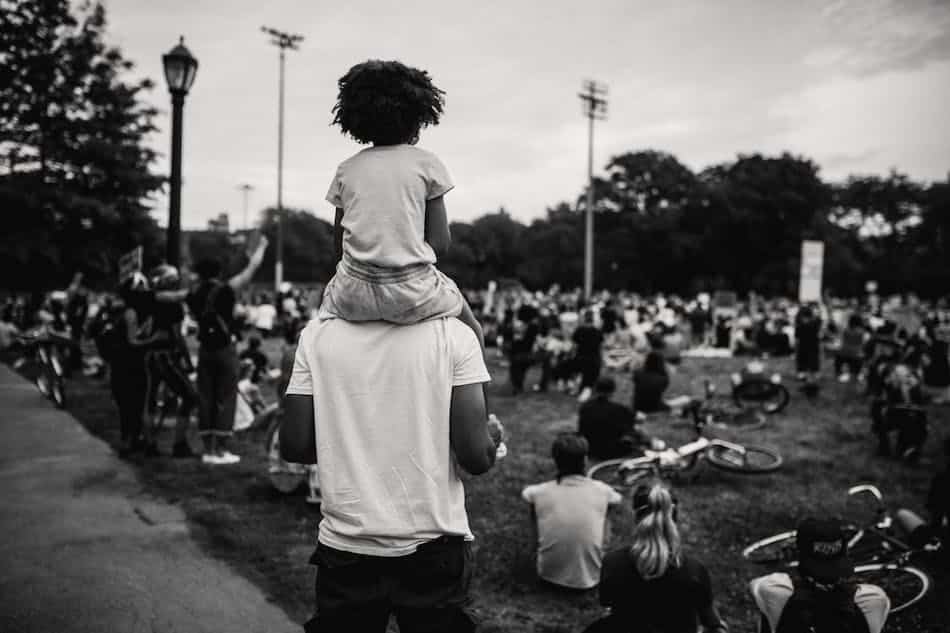Juneteenth 2022 celebrates 157 years since the emancipation of enslaved people in the United States, and at the same time it recalls a painful past. Mindfulness helps us to honor this past, celebrate the present, and chart a better course for the future.
Here we detail the connection between mindfulness and social justice, including:

What is Juneteenth?
Juneteenth 2022 marks the second annual newest federal holiday in the United States and commemorates the day in 1865 when Union soldiers arrived in Galveston, Texas to announce to enslaved people there that they were indeed free, nearly 3 months after the Confederacy surrendered, an act that activated the Emancipation Declaration in the South.
Still, the news took time to spread. Many enslavers chose not to relay this information to those they had enslaved until after the harvest, if at all. As government agents traveled the state, over 250,000 enslaved people in Texas finally learned they were no longer bound by the institution of slavery.
Celebrating the June 19th holiday began in 1866 and continued annually despite racism and Jim Crow laws, also known as Black Codes, which prevented Blacks from publicly gathering in many southern states. As Texans began moving to neighboring areas, so too did Juneteenth celebrations.
Outside of Black communities the holiday was little known, largely ignored by educational and government institutions. In 1980, Texas became the first state to pass legislation recognizing Juneteenth as a state holiday. 48 states had followed suit when in June of 2021 the US Congress passed a bill to make it a national holiday.
Under the legislation, the holiday is officially known as Juneteenth National Independence Day. This ‘Black Independence Day’ as it is sometimes known is the source of much emotion. The holiday aims to bring awareness to past and current injustices, thereby paving the way for a more equitable future. But it has not been well-received by everyone.
By taking a mindful approach to the past, while focusing on the present, we can honor all people with compassion, care, and equality - now and as we unfold into the future.
It’s so important that in working with racism as a heart disease, that we take the time to have a clear diagnosis of the problem so that we’re not trying to quickly fix something before we really understand the conditioning — what’s given rise to it. We need to understand how we got here.
- Ruth King, Author, Mindfulness of Race -

Mindfully Honoring the Past
Mindfulness invites us to be present. For some, this is misunderstood as a directive to never look back. This misguided interpretation is a form of spiritual bypassing. Mindfulness as an excuse for avoidance is mindfulness gone wrong.
Looking back is not easy, but it is of great value. Honoring the past lets us better understand and respect the events that have shaped our present. By asking questions, exploring with kind curiosity, compassion, and an open mind, we illuminate our own biases and are able to meet the experiences of others with greater empathy.
When looking back to honor history, consider the following mindfulness prompts:
Looking back at the painful institution of slavery can trigger strong emotions such as rage, anger, or grief. For those marginalized by systems of oppression, Juneteenth can be a painful reminder of the past, amplified by the continued racism of the present. Everything and anything that arises can be gently tended to with mindfulness.
White people working to mindfully honor the past are best served by practicing cultural humility. Cultural humility is the mindful practice of approaching cultural differences with an attitude of respect, curiosity and spaciousness. It is the lifelong practice of learning and self-reflection.
When we’re culturally humble, we’re comfortable with saying, ‘I don’t know what your experience has been, but I’m here to do my best to listen and learn.’ We accept our own limitations without self-judgment. Finally, we take action. We recognize and acknowledge power imbalances and neutralize them whenever possible.
There is such a thing as being anti-racist or just not racist. There is a distinction. It’s like the distinction between empathy and compassion. We say that compassion is empathy in action. Anti-racism is not being racist in action.

Celebrating the Present
Juneteenth 2022 invites us to mindfully review the past, but it also presents us with the opportunity to celebrate the present. Juneteenth is celebrated in Black communities with outdoor barbeques, family gatherings, and music. There may be local public events planned in your area that include festivals, parades, and performances. Traditionally, Juneteenth events included a reading of the Emancipation Proclamation.
People of all races might use Juneteenth as an opportunity to support and uplift Black people and address continued racism whether personal, relational, or systemic. Those in positions of power can ensure they are offering space and time for others to celebrate as they wish.
Non-Black people can celebrate too, in ways that adopt the mindful qualities of cultural humility. The following are some suggestions:
None of us is separate from the systems and structures that perpetuate white supremacy, racism and inequality. Neither are we without personal biases. The predictive nature of our brain makes it possible for us to use past information to act more efficiently in the present. But this neurological process also perpetuates great harm.
We cannot completely eliminate bias, but mindfulness of race can help us significantly reduce the hurt we cause ourselves and others. Ultimately, reducing personal biases opens us to the infinite possibility within each present moment, just as mindfulness does.
All of us are in this time together and it’s really painful, and also beautiful and tragic and heart warming and filled with possibilities as systems collapse and others come into being. [...] And what we do now is what our ancestors will know about us.
- Spring Washam -

Charting a Course for the Future
When we’re aware of the past, and mindful of the present, we’re better equipped to chart a constructive course for the future. Our mindfulness practice is integral to strengthening the following qualities:
Although it is a deeply personal practice, meditation has a role to play in the continued work of anti-racism, equity, and social justice. By developing virtues of wisdom and compassion, and giving us the gift of renewed energy and spirit, mindfulness and meditation allows us to respectfully honor the past, address our present-moment biases, and sustain the work that will build a better future.













